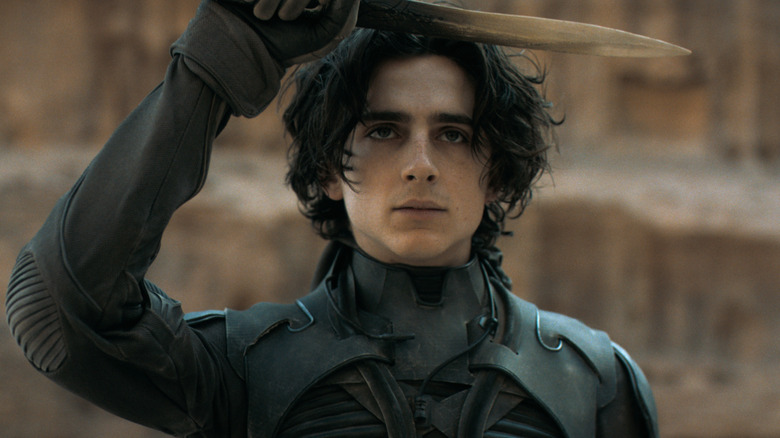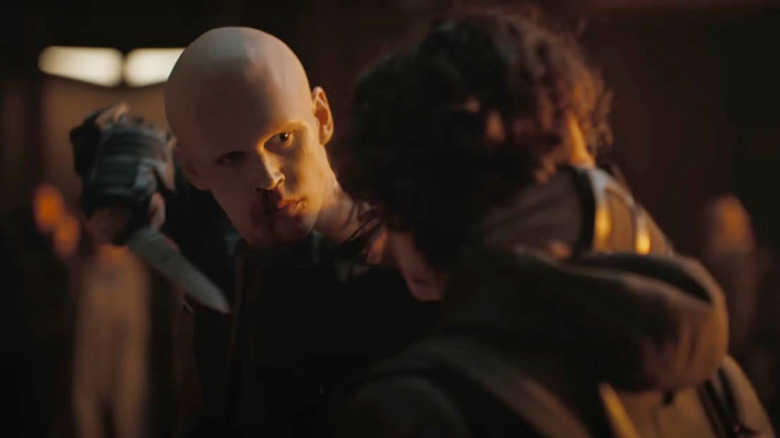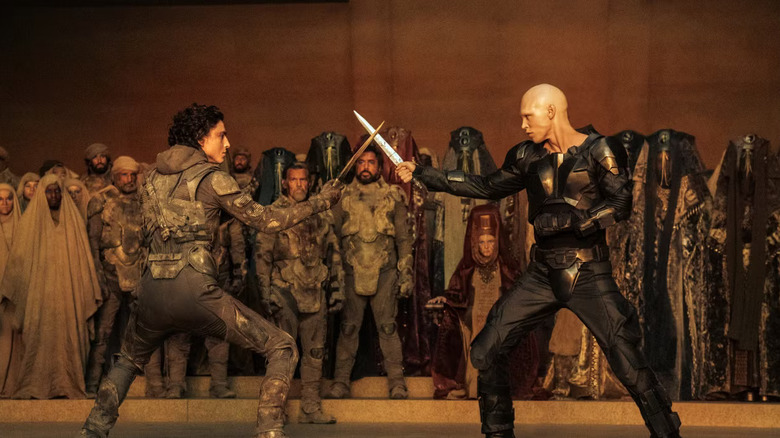Dune 2: What 'May Thy Knife Chip And Shatter' Really Means
As "Dune: Part One" comes to a close, Paul Atreides (Timothée Chalamet) and his mother, the Lady Jessica (Rebecca Ferguson), meet the Fremen out in the wilderness of Arrakis. In the process of that initial confrontation, a Fremen named Jamis (Babs Olusanmokun) challenges Paul to a knife fight to the death. As they face one another, weapons at the ready, Jamis says, "May thy knife chip and shatter."
Fast forward to the end of "Dune: Part Two." Paul has overthrown the Padishah Emperor's armies with a horde of lethal Fremen and is about to fight Feyd-Rautha (Austin Butler) in yet another knife duel to the death. This time, though, it's Paul who utters the lethal line, "May thy knife chip and shatter." An amused Feyd-Rautha says the line back to him, and the pair get down to their murderous business.
On the surface, the archaic line feels like a throwaway verbal memento. On the surface, it is a battlefield taunt that means what it says: that you look forward to your enemy's defeat. However, the "chip and shatter" line also has a deeper contextual meaning: Paul's growth as a leader and a member of the Fremen society.
How accurate is the chip and shatter line to the books?
When Jamis first utters the line to him, Paul is the exiled heir to House Atreides. His world is in shambles, and he's never even killed a man in combat. When it comes time for Paul to utter the words in his own turn (the timeline between the two events is technically relatively small — a major change compared to the books — but long enough), Paul Muad-Dib has become a calculating leader and a stone-cold killer. He has also become one with his new people and is able to correctly use their cultural idioms.
As with all cinematic adaptations, Denis Villeneuve's "Dune" movies have moments where they wander from the source material. In most areas, though, the pair of films is remarkably faithful to Frank Herbert's landmark novel, including the use of the "chip and shatter" line in the final fight. This scene also takes place within a handful of pages of the end of the book, the same way it more or less closes out the movie. Here's what the book says right before the pair square off: "'Is the Atreides ready?' Feyd-Rautha called, using the words of the ancient kanly ritual. Paul chose to answer him in the Fremen way: 'May thy knife chip and shatter!'"
To be fair, we don't get Feyd-Rautha's cheeky mimicry in the book version, but overall, the two scenes — one on paper, the other on the silver screen — are remarkably similar. They also bear that same weight of storytelling nuance that indicates Paul's shift toward identifying as a Fremen, an adjustment that continues to define him from here to the (kind-of) end of his days.
Paul's dark role as a fearless leader explained
Paul's adoption of the Fremen ways, culture, and vernacular is fun, and the desert people's transparent, honor-bound culture makes it easy to see the shift almost as a redemptive arc for the rising Atreides exile. But Paul's integration into the Fremen is calculated and focused on opportunity as much as anything else. Though he has some hesitations due to his violent visions, by the end of the movie, the boy has become a warlord and emperor.
In other words, this isn't the story of a noble hero rising from the ashes. It is one of an anti-hero burning with the horrifying power of a true phoenix. Paul Muad'dib Atreides doesn't end "Dune: Part Two" as a hero. He unleashes a bloodthirsty, galaxy-wide war.
This is, once again, an accurate reflection of the source material — and perhaps even truer to the author's original intent. Director Denis Villeneuve has pointed out that the way readers initially saw Paul when the book came out was actually off-target for author Frank Herbert. "He was disappointed by how people perceived Paul Atreides," Villeneuve told ScreenRant, "At the time, he felt that people were talking about Paul as a hero, and for him, he was an anti-hero. He was a dark figure. The book was a warning for him about a Messianic figure."


